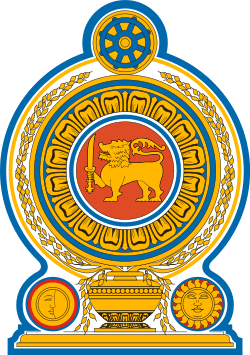Sri Lanka–United Kingdom relations
Sri Lanka |
United Kingdom |
|---|---|
| Diplomatic Mission | |
| High Commission of Sri Lanka, London | British High Commission, Colombo |
| Envoy | |
| High Commissioner Vacant | High Commissioner John Rankin |
Sri Lanka–United Kingdom relations, or British-Sri Lankan relations, are foreign relations between Democratic Socialist Republic of Sri Lanka and the United Kingdom of Great Britain and Northern Ireland.
History
During the Napoleonic Wars Great Britain, fearing that French control of the Netherlands might deliver Sri Lanka to the French, occupied the coastal areas of the island (which they called Ceylon) with little difficulty in 1796. In 1802 the Treaty of Amiens formally ceded the Dutch part of the island to Britain and it became a crown colony. In 1803 the British invaded the Kingdom of Kandy in the first Kandyan War, but were repulsed. In 1815 Kandy was occupied in the second Kandyan War, finally ending Sri Lankan independence. Following the suppression of the Uva Rebellion the Kandyan peasantry were stripped of their lands by the Wastelands Ordinance, a modern enclosure movement, and reduced to penury. The British found that the uplands of Sri Lanka were very suitable for coffee, tea and rubber cultivation. By the mid-19th century, Ceylon tea had become a staple of the British market bringing great wealth to a small number of white tea planters. The planters imported large numbers of Tamil workers as indentured labourers from south India to work the estates, who soon made up 10% of the island's population. These workers had to work in slave-like conditions living in line rooms, not very different from cattle sheds. The British colonialists favoured the semi-European Burghers, certain high-caste Sinhalese and the Tamils who were mainly concentrated to the north of the country. Nevertheless, the British also introduced democratic elements to Sri Lanka for the first time in its history and the Burghers were given degree of self-government as early as 1833. It was not until 1909 that constitutional development began, with a partly elected assembly, and not until 1920 that elected members outnumbered official appointees. Universal suffrage was introduced in 1931 over the protests of the Sinhalese, Tamil and Burgher elite who objected to the common people being allowed to vote.
Visits
- In May 2016 Sri Lankan President Maithripala Sirisena visited London for the Attend the Anti-Corruption Summit organized by the British government,
- In March 2015 Sri Lankan President Maithripala Sirisena visited London for the Commonwealth Day celebrations.
- In November 2013 Prince Charles and British Prime Minister David Cameron visited Sri Lanka for the Commonwealth Heads of Government Meeting
- In February 1998 Prince Charles visited Kandy to be the Chief Guest at the 50th Independence Day of Sri Lanka.
- In 1985 British Prime Minister Margaret Thatcher visited Sri Lanka for the opening of the Victoria Dam
- In October 1981 Queen Elizabeth II visited Sri Lanka.
- In February 1954 Queen Elizabeth II visited Sri Lanka to open the new parliament.

